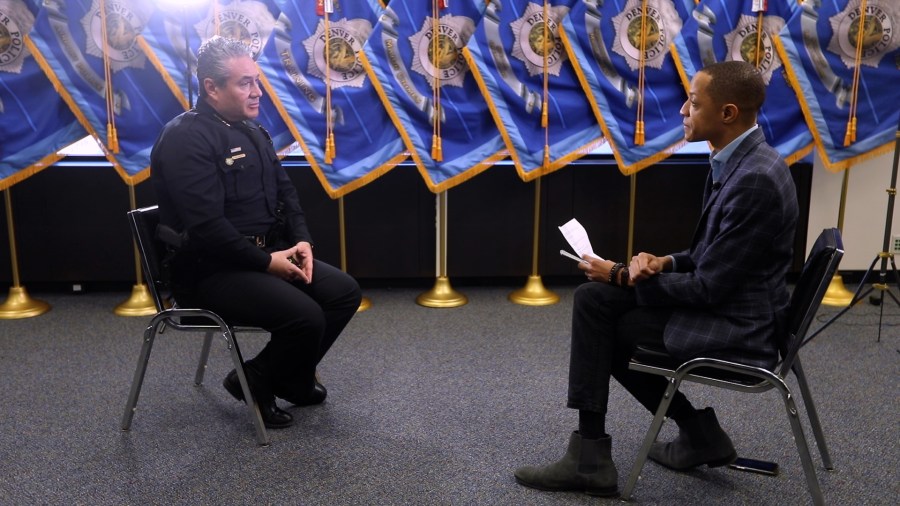DENVER (KDVR) — FOX31 sat down one-on-one with Denver Police Chief Paul Pazen on Thursday after the governor and state leaders announced a legislative package to invest in public safety.
Public safety officials were with the governor for the announcement, but Pazen was not. FOX31 wanted to know why and to ask him about the issues impacting the city and his department.
Violent crimes in Colorado have been rising for a decade. As Denver and the metro see rising crime, FOX31 asked the chief about cracking down on crime hotspots and what he thinks about how his department and the courts are doing to quell the surge.
In the interview with Joshua Short, Pazen pointed to “significant increases” in violent and property crime and raised concerns about repeat offenders.
Pazen addressed the ongoing issues of Union Station’s transit terminals and on public transportation throughout the city, where drug users congregate, using fentanyl among fellow riders and travelers.
Meanwhile, drug violations in Colorado are at a 10-year-low. So is the law too lax or is law enforcement letting criminals off too easily?
Short: Can you help clear the air about where you stand on the job that the DA is doing and on the job that the judges are doing when it comes to some of these repeat offenders, these repeat criminals that are back out on the street?
Pazen: Again, we are not pointing fingers. We are not going to establish blame on other aspects of the criminal justice system. We are pointing to the fact that we have significant increases in these violent crime categories and in these private, or excuse me, these property crime categories.
Josh: Let’s talk about some of the criminal activity we’ve seen. Obviously, we’ve talked about union station ad nauseam at FOX31 with our reports showing the lawlessness happening there.
Chief: I certainly can understand the frustration. I can understand the frustration that travelers have when they go to the bus terminal, hoping to meet their transportation needs, getting from point a to point B and be able to do that safely.

‘Accountability,’ ‘consequences’ important
Pazen said in the last few months, more than 500 people have been arrested for criminal offenses. He said it’s “important that there be accountability and consequences for individuals that are experiencing or involved in this criminal behavior.”
Josh: Do you think that’s part of the problem? You guys are enforcing the criminal code, but some argue the criminal code is not harsh enough that some people are out there telling us we’re doing these drugs, because we know we’re only going to get fined, as opposed to being held in jail or having a huge bond.
Chief: I’ve heard the exact same responses. I make it a point to go visit the bus terminal and the light rail platform is myself. I make it a point to walk around and engage with individuals to hear directly from them. And what just said, where individuals recognize that there’s a lack of accountability and consequence, and that there is no consequence to this criminal behavior. There’s no changed behavior that is taking place.
Polis’ plan for public safety invests $113 million over the next two years in a number of areas, including mental health, schools and community groups. Pazen said he would not weigh in on the measure.
“First and foremost, we’re very much believers in the ‘and’ not ‘or’ approach. This department, this city has led the country in many ways with regards to co-responders, the STAR program, our outreach case coordinators.”
The STAR program removes police from some 911 calls involving mental health or substance. After a successful pilot program that diverted 1,400 emergency calls from police involvement without issue, the city expanded it last year to seven days a week.
“We very much believe that getting the appropriate response to an individual who is in crisis gets us better outcomes. And that is our goal,” Pazen said.
“But then to draw a line and say that these are the driving factors behind auto theft, burglary, robbery, shootings, homicides, you need an ‘and’ approach. And we certainly are very supportive of alternative response co-responders, outreach case coordinators, but we have to be real about these issues.”
